Crofters could be considering mounting a legal bid against government over new Common Agricultural Policy (Cap) regime payment rates.
According to the chief of the Scottish Crofting Federation, Patrick Krause, many crofters and farmers are unhappy about the proposed payment rates for Regions 2 and 3 under the new regime.
“The Scottish Government has indicated the rates (for basic payments) will be around £5 per hectare for Region 3 land and £17 per hectare for Region 2, compared to £103 per hectare for arable and permanent grassland. The very low rates for Regions 2 and 3 are just not enough to ensure survival,” said Mr Krause.
“Upland farmers in Wales mounted a successful legal challenge to the government when similar regions and rates were announced there. Many believe a similar challenge is warranted here.”
Together with environmental charity RSPB Scotland, the crofting body has called on government for an “immediate rethink” of the minimum activity rules.
The rules, which require farmers to adopt either a minimum stocking rate or carry out an environmental assessment of land to demonstrate that it is “naturally kept land”, also apply to those wishing to apply for support under the Agri-Environment Climate Scheme (AECS).
RSPB Scotland’s head of land use policy, Vicki Swales, described the rules as “nonsensical” and warned they would exclude many farmers and crofters from receiving vital subsidy support.
“While undertaking environmental assessments is generally to be encouraged on farms, the requirements set out are extremely demanding and likely to be beyond the means of most farmers and crofters to carry out on an annual basis,” said Ms Swales.
“More worryingly is that we are now hearing that those who might have used the agri-environment route and who are seeking to renew recently expired agreements are being told they are not eligible because they do not meet the minimum stocking density. This is sending farmers and crofters round in circles and makes no sense whatsoever. The Scottish Government must act quickly to change the rules.”
The organisations have urged government to remove the requirement that applicants to AECS must be eligible for the Basic Payment Scheme, thus removing the minimum activity rules attached to the scheme.
Mr Krause said: “It is illogical that a government which is working hard to give crofters and other communities greater access to land is, at the same time, introducing Cap rules that will deny people access to financial support that makes land management a viable activity.”
A Scottish Government spokeswoman said the government recognised the importance of crofting and the benefits it brought to the economy and environment.
“This new Cap is the greenest ever, and has been designed to target support at genuine farming and ensure the best system possible for Scottish agriculture as a whole and the environment,” she said.
“The Scottish Government wants to support genuinely active farmers and crofters and as such all active crofters are eligible to apply for all support on offer, including Basic Payment, greening and voluntary coupled support as well as the dedicated £20million available for crofts and small farms under the Scottish Rural Development Programme.”
